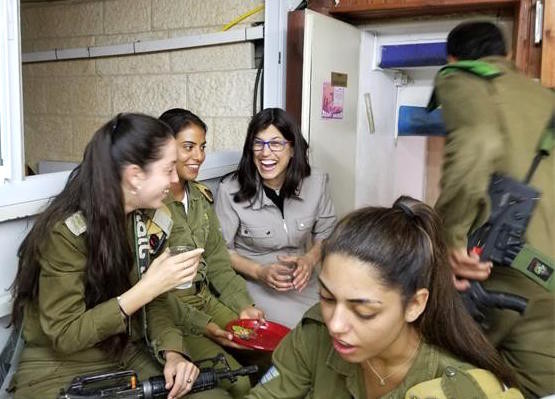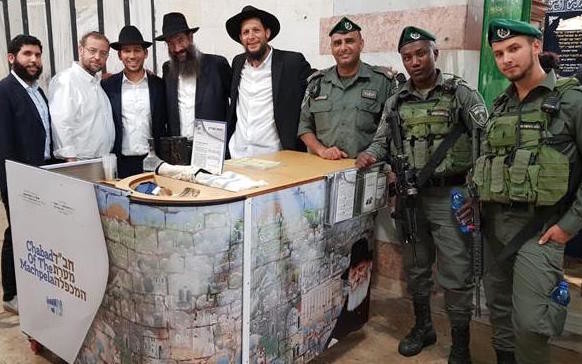Chabad keeps faith with IDF guarding Hebron
With a lump in his throat, a new recruit to the Israel Border Police said that he knew one of the soldiers who had been laid to rest a day earlier after being shot by a terrorist at a West Bank bus stop.
“This is not an easy time for Israel,” said the young man, anonymous for security reasons. He is a lone soldier only a few months into his tour of duty. “There are at least a few more [enemy acts] planned.”
But his eyes lit up when he noted he would return to his base in Hebron right after Shabbat, where he alternates between guarding Me’arat Hamachpelah and the general Hebron area.
While Hebron is no cakewalk in terms of tension and prevailing threats, he said the assignment is cushioned by the presence of Rabbi Danny Cohen, who, with his wife Batsheva, has been providing a spiritual and emotional buffer for soldiers there for the past 16 years as Hebron’s head Chabad-Lubavitch emissaries.
With admiration, the 19-year-old member of the unit known in Hebrew as “Magav” (border guard) described how Rabbi Cohen makes the rounds to every outpost, checkpoint and base before Shabbat and Jewish holidays to ensure that the soldiers are emotionally, spiritually and materially fortified. The program comes complete with the delivery of extra rations of cake, coffee and candles for Shabbat.
“It is really quite amazing,” he said.
The Cohens, who arrived in 2002, also serve local residents and the thousands of tourists who visit Hebron each year from Israel and around the world. But it is their work with soldiers that have earned them their reputation.
Upwards of 500 troops are stationed in Hebron at any given time. Every four months, the rotation changes. Over the years, many thousands of soldiers have had their lives touched by the Cohens and their dedicated staff.
For Rabbi Cohen, who served in the Givati Brigade and whose oldest son is training to be a paratrooper, helping soldiers has a deeper meaning. In many cases, it is the first time that some of these young Israelis have had any contact with Torah Judaism. To some, the Torah classes he offers are their first exposure to traditional learning.
Of the many yeshivah students in Hebron, there are always two circulating the bases to help soldiers put on tefillin, while another emissary on staff mans a permanent tefillin booth and coffee corner at the Cave of the Patriarchs.
Batsheva Cohen, who instituted classes and special events for women soon after the couple’s arrival, has watched her weekly classes grow from four attendees to dozens of regulars at four bases. The programs include courses in Jewish law and Jewish thought, as well as challah baking, candlestick making and even a tour of the mikvah.
“For some of these women, this may be the only time they will even see some of these things,” she said. “Due to the rotation and the sheer number of soldiers we come into contact with, we don’t always get to see how this experience may have impacted their lives.”
Rabbi Cohen is quick to emphasize that they are not the first to serve the city in modern times, citing the presence of continuous Chabad activity from the time the city was returned to Jewish hands in the summer of 1967 in the aftermath of the Six-Day War. And Hebron Chabad’s history goes much further back, he said. “My wife and I are part of a storied history that began when the first Chabad community was established here almost 200 years ago.”
In 1844, Rebbetzin Menucha Rochel Slonim, the daughter of the second Lubavitcher Rebbe, left Russia with her husband, Rabbi Yaakov Kuli Slonim, to fulfill their dream of living in Hebron. As matriarch of the Chabad community, she became known for her piety and wisdom by Jews and Arabs alike, and gained a reputation as a spiritual counselor. She died in 1888 and is buried in the old Hebron cemetery.
In 1878, a wealthy Turkish Jew by the name of Chaim Yisrael Romano built a palatial home and guesthouse; in 1901, the renowned Sephardic sage Rabbi Chaim Chizkiyahu Medini (the Sdei Chemed) moved there and opened a yeshivah. After learning that the Romano family was interested in selling the property, the Sdei Chemed offered it to the fifth Lubavitcher Rebbe, who used it to establish Yeshiva Torat Emet.
More recently, for the last three years, with the help of an anonymous donor, the Cohens have erected a massive Chayei Sarah Tent to accommodate the thousands of visitors who converge on the city annually on the Torah portion of that name. That week tells the story of Avraham buying Me’arat Hamachpelah as a burial plot for his wife.
“A beautiful welcome center is also planned for the area outside of the cave,” Cohen said, adding that the beautification of Hebron “to give it the honor it deserves,” in addition to bolstering its spiritual life.
Cohen says he looks forward to the time when the Jewish redeemer will lead the Jewish people out of exile. “We know that one of his first stops is to awaken the sleeping fathers and mothers [buried in Hebron],” he said.

 45.0°,
Mostly Cloudy
45.0°,
Mostly Cloudy 







